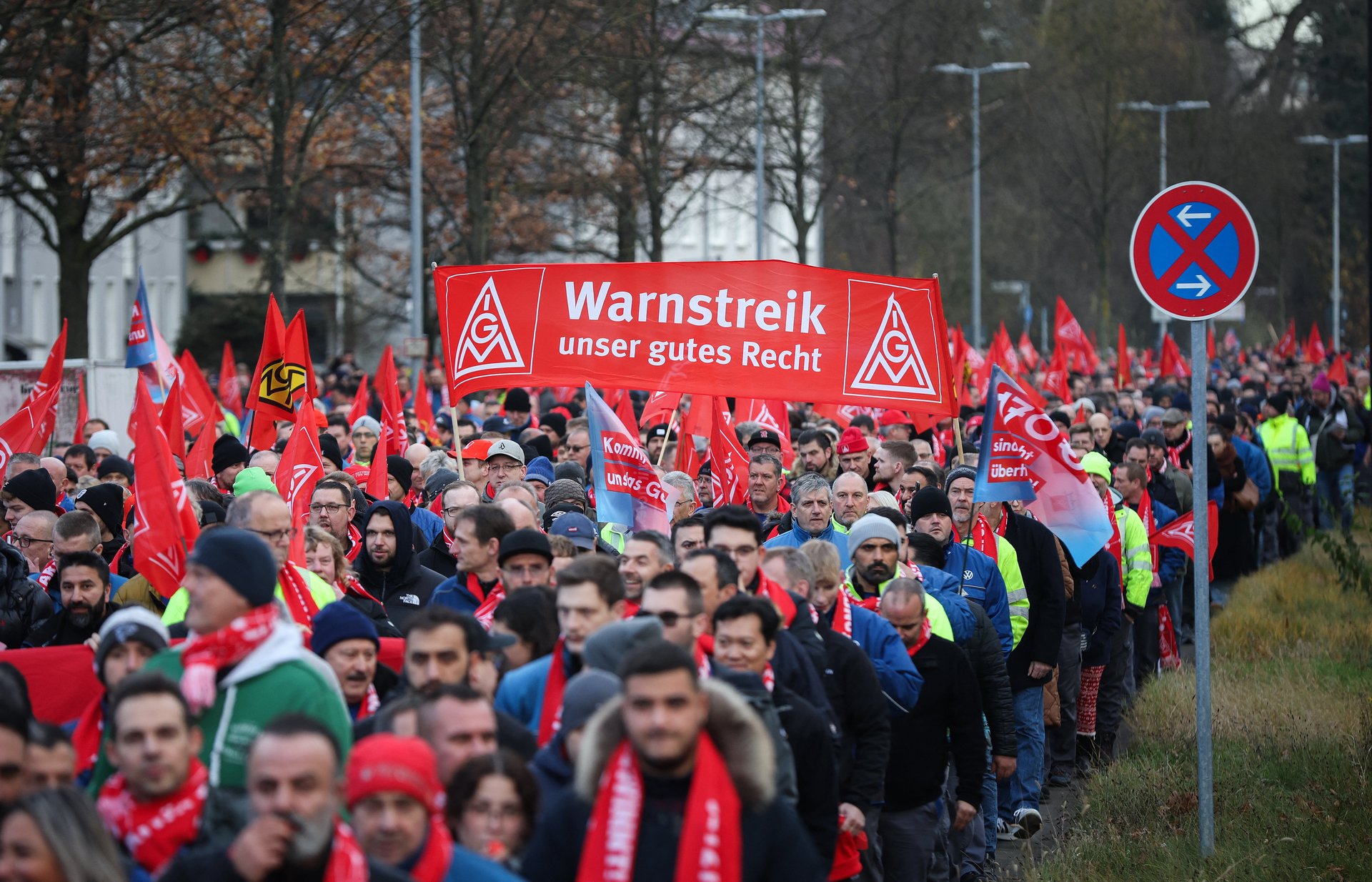Volkswagen is facing its first major strike in years. Here's what to know
Thousands of workers joined walkouts as the German auto giant plans to close multiple factories

Volkswagen (VWAGY) workers across the automaker’s home country have gone on strike to protest the company’s decision to change labor agreements and — potentially — close factories. Here’s what you need to know.
Suggested Reading
What happened?
Tens of thousands of workers employed at nine Volkswagen car and component plans across Germany launched two-hour strikes Monday, shutting down assembly lines.
Related Content
Affected plants include VW’s main plant in Wolfsburg, which employs 70,000 people and produces the Golf and Tiguan vehicles, as well as the 14,000-worker plant in Hanover, which makes the ID. Buzz, according to Reuters. VW’s plant in Zwickau, which makes the company’s electric vehicles, is also expected to be hit with strikes on Monday and Tuesday.
Workers on the morning shifts went on strike for two hours, while evening shift employees plan to leave early to join the protests against VW’s proposed wage cuts and factory closures. An agreement with management to not go on strike ended Saturday.
Signs displayed at walkouts state “Warning strike is our right,” “Ready to strike across the coast,” and “FIGHT FOR OUR FUTURE,” according to photos. “We can’t do anything. Finally, do your job!” read one sign.
Unless a deal is struck between workers and VW management, the strikes could escalate into 24-hour walkouts or unlimited stoppages. That would slam VW’s production as it struggles to increase sales and boost its flagging profit.
The lead-up
The walkouts come after VW’s earnings have suffered in recent months. The company looks to slash $11 billion in costs and faces tough competition from foreign automakers entering the European market.
VW, Europe’s biggest automaker, reported an operating margin of 3.6% last quarter, its lowest in about four years, along with declining operating profit and revenue. Sales declined by 8.5%. VW’s finance chief, Arno Antlitz, in September, said that the company hasn’t been able to rebound since the pandemic and that it’s facing a demand shortfall of about 500,000 cars — or the equivalent of two plants.
According to VW’s works council, the company plans to close three of its plants in Germany and downsize operations at all of its facilities in the nation. Mass layoffs are being planned, with entire departments facing closure or relocation. In total, the automaker employs 300,000 people in Germany.
VW has never closed a plant in its native country. The last time it closed any factory was in 1988, when it shut down its location in Pennsylvania’s Westmoreland County. In October, the automaker said it would close its Audi plant in Brussels, where it makes the Audi Q8 e-tron, in February 2025.
In September, VW ended a 30-year-old job security pact that protected workers from layoffs, and it also ended several other labor deals. VW had provided protection against layoffs through 2029, but layoffs can now begin as soon as June 2025, according to the automaker.
VW had demanded a 10% pay cut for its German workers, according to Daniela Cavallo, the head of its works council, along with no pay raises for the next two years.
IG Metall, a metalworkers union representing VW workers, last month offered to back a $1.6 billion plan to cut costs, which included forgoing bonuses for 2025 and 2026, on the condition that no factories would be closed. The union also proposed creating a fund to finance temporarily reduced working hours in areas of the business that are suffering from overcapacity.
VW rejected that plan Friday, telling Reuters that “sustainable savings of 1.5 billion euros cannot be ascertained even after intensive analysis.”
What comes next
The next round of negotiations is scheduled for Dec. 9, or next Monday. VW, IG Metall, and the works council have already had three meetings.
“If necessary, this will become the toughest wage dispute Volkswagen has ever seen,” IG Metall’s chief negotiator Thorsten Groeger said in a statement. “How long and intense this dispute will be is Volkswagen’s responsibility at the negotiating table.”
Groeger said in a speech on Monday, “Those who ignore the workforce are playing with fire — and we know how to turn sparks into flames.”
Cavallo, the head of the VW works council, said Monday that the Dec. 9 negotiations will determine whether workers’ strikes escalate. “Unfortunately, the signals recently sent by management are not really encouraging,” she said, according to Reuters (TRI).
If strikes escalate, it would be the first time in years that VW has been hit with a major strike. Thousands of workers participated in warnings strikes in 2021, while some 50,000 workers participated in strikes in 2018.